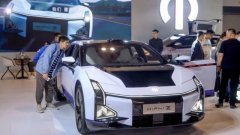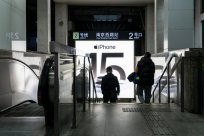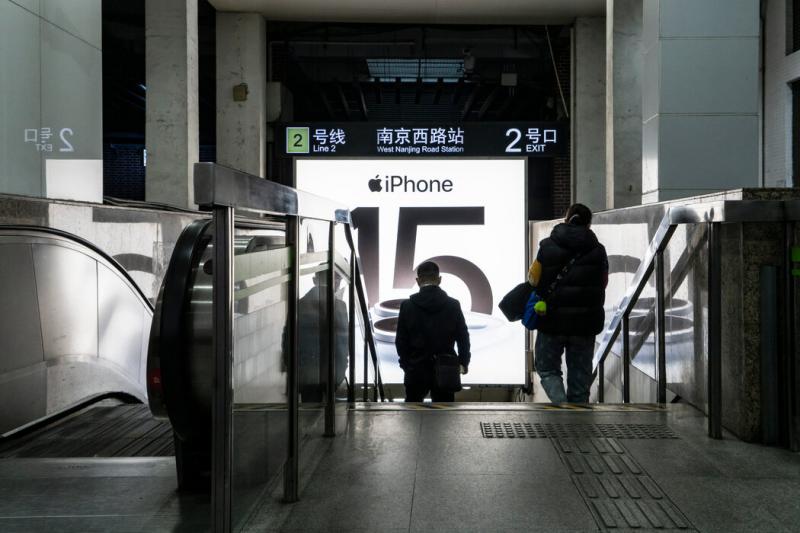
Over the years, Apple has been dominated by China's high -end smartphone market.Compared with the performance of the iPhone, other companies are not competitive than the performance of the iPhone, or in the eyes of rich, well -known shoppers, they do not have the symbol of the status of the iPhone.
But more and more evidence shows that for many Chinese, the iPhone no longer has the previous attraction.The first six weeks of each year have always been the peak season for Chinese consumers to buy new mobile phones. According to the data of the Counterpoint Research of the smartphone market, China's iPhone sales in the first six weeks of this year have decreased by 24%compared with the same period last year.
At the same time, as one of Apple's old opponents in China, Huawei's sales have increased by 64%.
For Apple, this is a challenge.In February this year, it released a virtual reality head for $ 3,500. Analysts said that the latest product distance is still several years old.Apple has also suffered two regulatory strikes this month: the European Union fined its anti -competition in music streaming nearly $ 2 billion; in addition, the US government filed a lawsuit against Apple and accused them of violating the antitrust law.
In the past ten years, China has been the most important iPhone market after the United States, accounting for about 20%of Apple's sales.Now, a series of factors may weaken Apple's position in the Chinese market: consumers slow their expenditures, and the Chinese government requires people to avoid the pressure on the use of equipment manufactured by American companies and the rejuvenation of Huawei, a leading domestic company.
"Apple's golden age in China has ended," said Sui Qian, a senior director of market research company Techinsights.One of the biggest reasons is that the tension between China and the United States about trade and technology has increased, and Sui Qian said.If the geopolitical pressure does not have a significant relief, it will be difficult for Apple to maintain its position in the Chinese market.
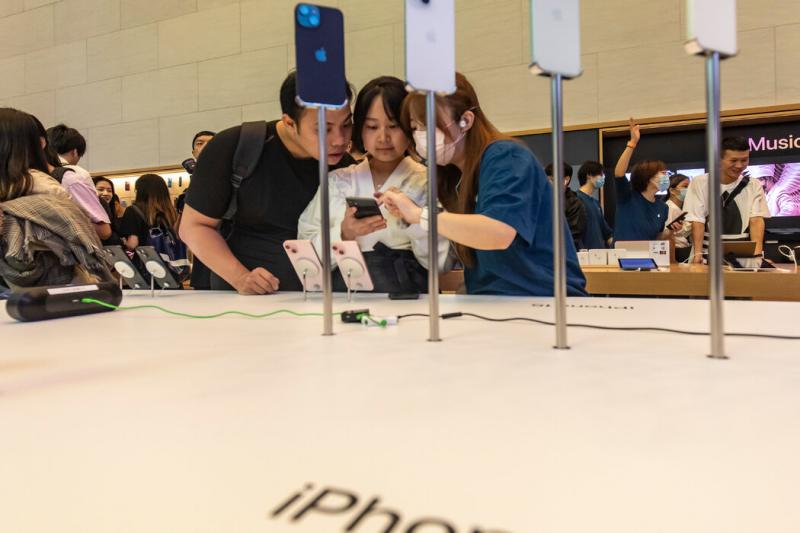
"This is not just a matter of consumer," Sui Qian said."This is the fundamental reason why the competition between the two superpowers is the root cause of the overall change."
In the case of intensified tension between China and the United States, there are almost no losses faced by American companies. It is large. Its latest mobile phone iPhone 15 has been launched in September last year.This is the first iPhone series using titanium frame, and an operation button is added to take pictures or turn on the flashlight by setting.
"Five years ago, Apple was a very powerful brand in China. People would take tents to the release of new products all night outside the Apple Store," said Zhong Xiaolei, an analyst at the market research company Canalys in Shanghai."The launch of iPhone 15 has not caused much sensation."
Six months later, Apple made significant advertisements in cities such as Shanghai, reminding residents that they could still buy iPhone 15 nearby.The company said at the conference call with Wall Street analysts that similar promotional activities helped the iPhone occupy four of the six best -selling smartphones in China in the last three months of last year.But the eye -catching advertisement did not convince the 22 -year -old Jason Lee. When he needed to change his iPhone 13 Pro Max, he did not go to the Apple shop in Nanjing East Road, Shanghai Shopping Area.
Mr. Li went directly to the Huawei flagship store opposite the street, where he calculated whether to buy Mate 60 Pro.
"I don't want to use iOS anymore," he refers to the iPhone's operating system."Not too new."
Apple refuses to comment on this article.
For some Chinese people, buying mobile phones has become a political statement.Relevant disputes have erupted on the Internet, such as whether the iPhone does not respect Chinese technology companies, or whether it is equivalent to handing personal data to the US government.Last year, according to some people working in Chinese government departments, they received a notice and do not use iPhone in their work.
These instructions were made in Huawei's launch of Mate 60 Pro less than two weeks later. This smartphone is equipped with Huawei's own operating system, and the chip is more advanced than the previous domestic chips.
Huawei released this phone in the last few days when Minister of Commerce Gina Raymond visited China.Chinese commentators and official media praise it a victory in the face of Huawei's efforts to restrict the company's development of the company in Washington.
Mate 60 Pro immediately caused a sensation.It increases the sales volume of Huawei mobile phones, and the growth momentum has continued until the first six weeks of this year. Huawei claimed that it had occupied the second largest share in the Chinese smartphone market, from 9%a year ago to 17%(data from CounterpointtTo.
"Today, the feeling of holding the Mate 60 series of mobile phones gives people feel, just like many years ago if someone saw them holding the iPhone on the street," said Lin Keyu, a senior analyst at the Hong Kong Research Company Counterpoint Research.He said that this is especially true for people over 35 years old. People of this age are the largest buyers of smartphones.
The share of the Chinese smartphone market shared by many companies.Domestic brands Vivo, OPPO and Xiaomi and Apple and Huawei compete for the largest share.
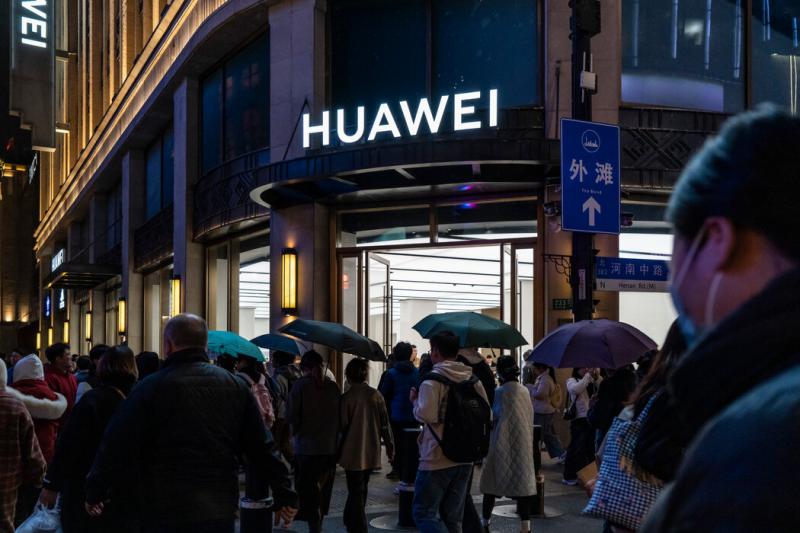
Apple has sold iPhone in China since 2009.The last time Apple lost in the competition with Huawei was 2019. At that time, the Trump administration accidentally rescued Apple's life by restricting US technology companies and Huawei.Google, a manufacturer of Android operating system, and several semiconductor companies cut off the supply of this Chinese smartphone manufacturer.
With Huawei's trouble, Apple's market share in China has rebounded.According to the data of Countpoint, Apple's share in the Chinese mobile phone market rose from 9%in 2019 to 22%in 2022.Apple said in the fiscal year of the September 2022 that the revenue from Greater China reached a record $ 74 billion.
But the restrictions of the US government have also forced Huawei to develop their own wireless communication chips and operating systems, and finally developed the technology behind Mate 60 Pro.Huawei's operating system has always been attractive to Chinese shoppers. Many China's largest technology companies have developed applications for it and further isolate Chinese users from overseas platforms.
In contrast, Huawei's innovation makes Apple's latest mobile phones look boring.Due to the difficulties of the Chinese economy's recovery after the new crown epidemic, many consumers hesitated whether to spend money on mobile phones.Daniel Afs, an Apple analyst of Wadebush Securities, said that the Chinese have a total of 215 million iPhone and about 125 million owners have not upgraded to updated devices in the past three years.
Apple has responded to challenges facing China.CEO Tim Cook went to China to visit Apple's supplier.Last week, he attended a grand opening ceremony held by an Apple store near Jing'an Temple in Shanghai for a group of Apple fans. This is Apple's eighth store in Shanghai, the 57th store in China.Apple also said that it is expanding the company's application research laboratory in Shanghai.
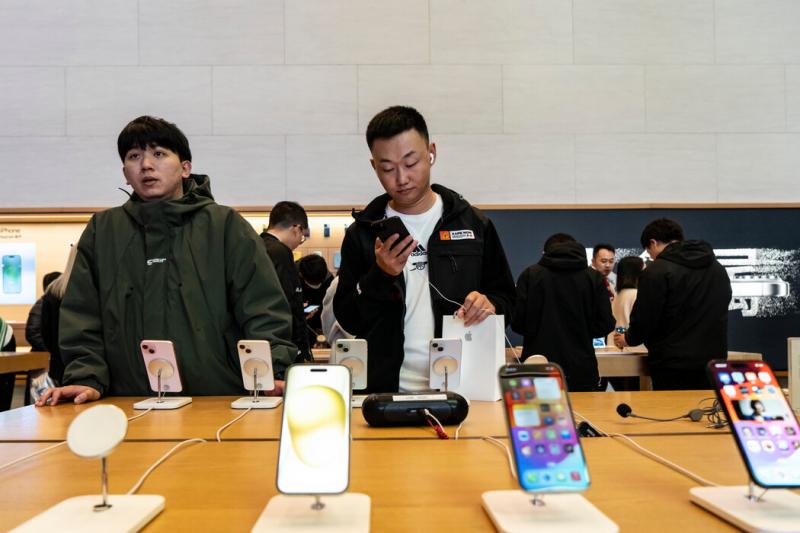
But in the eyes of some consumers, the U.S. government's practices of Apple Chinese competitors have shadowed Apple's efforts.Essence
Chi Miao Miao (Yin), 38, is the genius Bar of Apple Stores on Nanjing East Road, Shanghai to help solve the failure of his iPhone 12.He said he recently bought a Huawei Mate 60 Pro as his second phone.In 2018, Huawei's chief financial officer Meng Wanzhou was arrested by the Canadian authorities under the request of the United States. The United States accused her of misleading the bank in Huawei's Iranian business.After this incident, Mr. Chi was interested in Huawei.Meng Wanzhou was arrested in China that caused strong support for her. Many people think that she was detained as hostages.
"Huawei is our own brand. Due to this political incident, I think that we Chinese should be united," Mr. Chi said.
At the sales office on the second floor of the Apple Store, Li Bin (Yin), 23, and two friends are arguing about the latest iPhone.Mr. Li said that Huawei mobile phones are almost comparable to Apple's quality. Although he thinks that the iPhone is a bit better, the price is higher.
"Wait for me to be more richer in the future, I may switch to iPhone," Mr. Li said.

